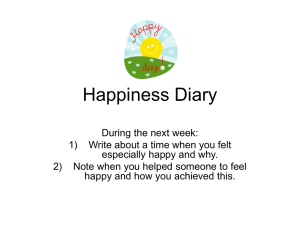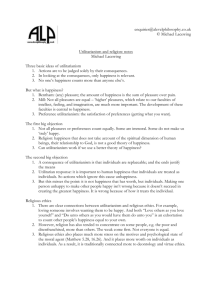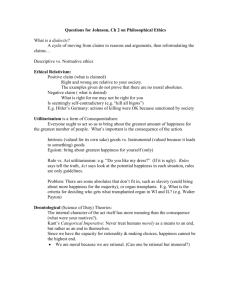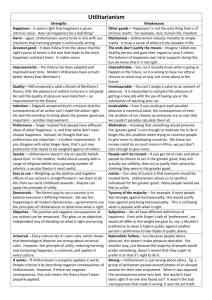Utilitarianism
advertisement
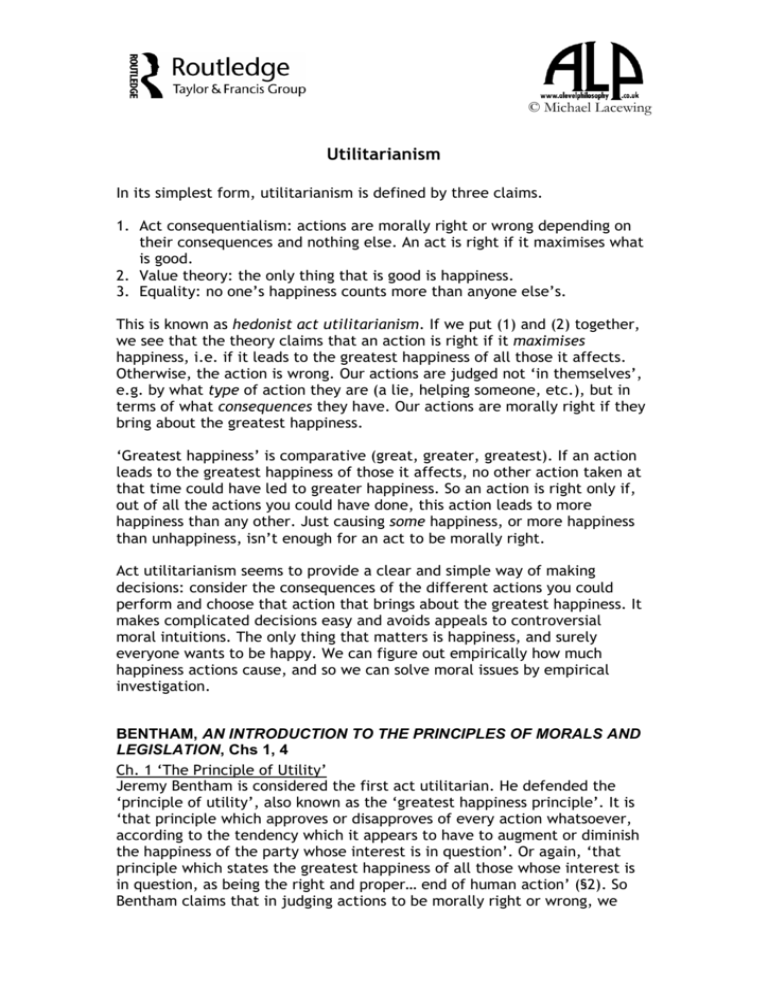
© Michael Lacewing Utilitarianism In its simplest form, utilitarianism is defined by three claims. 1. Act consequentialism: actions are morally right or wrong depending on their consequences and nothing else. An act is right if it maximises what is good. 2. Value theory: the only thing that is good is happiness. 3. Equality: no one’s happiness counts more than anyone else’s. This is known as hedonist act utilitarianism. If we put (1) and (2) together, we see that the theory claims that an action is right if it maximises happiness, i.e. if it leads to the greatest happiness of all those it affects. Otherwise, the action is wrong. Our actions are judged not ‘in themselves’, e.g. by what type of action they are (a lie, helping someone, etc.), but in terms of what consequences they have. Our actions are morally right if they bring about the greatest happiness. ‘Greatest happiness’ is comparative (great, greater, greatest). If an action leads to the greatest happiness of those it affects, no other action taken at that time could have led to greater happiness. So an action is right only if, out of all the actions you could have done, this action leads to more happiness than any other. Just causing some happiness, or more happiness than unhappiness, isn’t enough for an act to be morally right. Act utilitarianism seems to provide a clear and simple way of making decisions: consider the consequences of the different actions you could perform and choose that action that brings about the greatest happiness. It makes complicated decisions easy and avoids appeals to controversial moral intuitions. The only thing that matters is happiness, and surely everyone wants to be happy. We can figure out empirically how much happiness actions cause, and so we can solve moral issues by empirical investigation. BENTHAM, AN INTRODUCTION TO THE PRINCIPLES OF MORALS AND LEGISLATION, Chs 1, 4 Ch. 1 ‘The Principle of Utility’ Jeremy Bentham is considered the first act utilitarian. He defended the ‘principle of utility’, also known as the ‘greatest happiness principle’. It is ‘that principle which approves or disapproves of every action whatsoever, according to the tendency which it appears to have to augment or diminish the happiness of the party whose interest is in question’. Or again, ‘that principle which states the greatest happiness of all those whose interest is in question, as being the right and proper… end of human action’ (§2). So Bentham claims that in judging actions to be morally right or wrong, we should only take into account the total amount of happiness that the action may produce. Likewise, in our own actions, we should aim to produce the greatest happiness we can. Bentham’s hedonism Utilitarianism is so-called because it is concerned with ‘utility’. In §3, Bentham makes the connection between utility and happiness: By utility is meant that property in any object, whereby it tends to produce benefit, advantage, pleasure, good, or happiness, (all this in the present case comes to the same thing) or (what comes again to the same thing) to prevent the happening of mischief, pain, evil, or unhappiness to the party whose interest is considered. In §5, he clarifies what he means by ‘interest’: A thing is said to promote the interest, or to be for the interest, of an individual, when it tends to add to the sum total of his pleasures: or, what comes to the same thing, to diminish the sum total of his pains. So, something has ‘utility’ if it contributes to your happiness, which is the same as what is in your interest. And happiness is pleasure and the absence of pain. The claim that pleasure, as happiness, is the only good is known as hedonism. In Ch. 5, Bentham goes on to list fourteen ‘families’ of pleasure, such as sensory pleasure, the pleasures of exercising one’s skills, the pleasures of having power, the pleasures of memory, and the pleasures of benevolence. He also lists twelve families of pain, many deriving from similar sources as pleasure. Ch. 4 How happiness may be calculated Bentham argued that we can measure pleasures and pains and add them up on a single scale by a process he called the ‘felicific calculus’ (‘felicity’ means happiness). If a pleasure is more intense, will last longer, is more certain to occur, will happen sooner rather than later, or will produce in turn many other pleasures and few pains, it counts for more. In thinking what to do, you also need to take into account how many people will be affected (the more you affect positively, and the fewer you affect negatively, the better). The total amount of happiness produced is the sum total of everyone’s pleasures produced minus the sum total of everyone’s pains. MILL, UTILITARIANISM, Chs 1, 2 John Stuart Mill begins his book on utilitarianism by remarking on how surprising it is that, with all the developments in knowledge over the last two millennia, there is still little agreement on the criterion for right and wrong. In science, we start from particular observations and work out the laws of nature from them. But our usual method of empirical induction doesn’t work in ethics. Part of the difficulty is that we can’t easily infer the principles of morality from particular cases, because we first need to know the principles in order to judge whether an action is right or wrong. However, we shouldn’t exaggerate the disagreement. Many philosophers agree that morality involves moral laws and they agree on what many of these laws are (e.g. concerning murder, theft, harming others, betrayal, etc.), even if they disagree about why these are moral laws. Mill then remarks that people’s moral approval and disapproval is, as a matter of fact, strongly influenced by the effects of actions on their happiness. So the principle of utility has played a significant role in forming moral beliefs, even if this hasn’t been recognised. When Mill wrote Utilitarianism, there was a lot of misunderstanding of what utilitarians actually believed. Ch. 2 clarifies what utilitarianism is – what it really claims – by considering and replying to eleven objections which Mill argues arise from misunderstanding the theory. We consider only some of these here; others are discussed in handouts ‘Utilitarianism: Happiness and Preferences’ and ‘Utilitarianism: Objections’. 1. ‘Utility’ means what is useful, not what is pleasurable. Utilitarianism therefore ignores the value of pleasure. Reply: Obviously a misunderstanding. Mill reasserts Bentham’s central claims. First, ‘actions are right in proportion as they tend to promote happiness, wrong as they tend to produce the reverse of happiness’. Second, ‘By happiness is intended pleasure, and the absence of pain; by unhappiness, pain, and the privation of pleasure.’ Third, ‘pleasure, and freedom from pain, are the only things desirable as ends’. 2. We do not need happiness and many wise and noble people have lived without it. Reply: True, but what have noble people sacrificed their happiness for? Surely, it is the happiness of others. If not, then what a wasted sacrifice! Utilitarianism recognises the virtue of sacrificing your happiness for others – the aim remains to increase the total happiness in the world. 3. Utilitarians make right and wrong depend upon the agent’s happiness. Reply: Another obvious misunderstanding. It is the happiness of everyone that is the criterion of right action. For this reason, we should organise society and raise children in such a way that each person feels that their own happiness is bound up with the happiness of others, that they are made happy by making others happy. 4. Utilitarianism is a godless theory. Reply: It isn’t. Utilitarianism can easily be made compatible with Christian teachings about God. (Given his social context, Mill only mentions Christianity.) 5. Utilitarianism will lead to people sacrificing moral principles for ‘expedient’ immoral action. Reply: ‘Expedient’ usually means either what is in the person’s own interest or in the short-term interest, as when someone lies to get out of a tricky situation. Where an action is ‘expedient’ in this sense and sacrifices the greater happiness of people generally, then utilitarianism condemns it.





